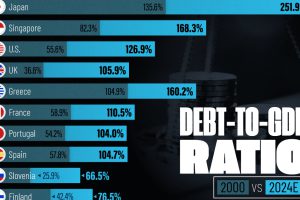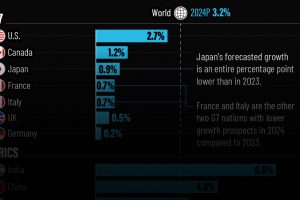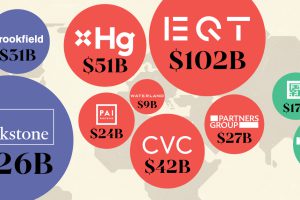The Rising Cost of Government Debt
This was originally posted on our Voronoi app. Download the app for free on iOS or Android and discover incredible data-driven charts from a variety of trusted sources.
Today’s high interest rate environment is making the cost of servicing the national debt more expensive, and this is projected to increase further in the future.
While the previous decade of low rates made high debt loads easier to manage, the current climate paints a very different picture. Roughly $2 billion is spent each day on America’s debt costs, diverting funds away from other areas of the economy, such as infrastructure and Social Security. As debt accumulates on a global scale, many other countries face a similar reality.
This graphic shows the rising cost of government debt across select economies, based on analysis from the Institute of International Finance (IIF).
The Cost of Servicing the National Debt, by Country
Below, we show the national net interest expense expressed as a percentage of government revenues. These figures compare the 2021 and 2023 annual average to 2024 and 2026 annual average forecasts for each country.
| Net Interest Expense, % of Government Revenue | 2021/2023 Average |
2024F/2026F Average |
|---|---|---|
| 🇺🇸 U.S. | 8.7% | 10.9% |
| 🇮🇹 Italy | 7.7% | 8.8% |
| 🇬🇧 UK | 7.2% | 6.1% |
| 🇬🇷 Greece | 5.3% | 6.6% |
| 🇪🇸 Spain | 4.6% | 6.0% |
| 🇵🇹 Portugal | 4.6% | 5.2% |
| 🇫🇷 France | 3.0% | 4.2% |
| 🇩🇪 Germany | 1.2% | 1.9% |
| 🇯🇵 Japan | 1.0% | 0.4% |
| 🇨🇭 Switzerland | 0.4% | 0.3% |
| 🇨🇦 Canada | -0.4% | 1.2% |
| 🇩🇰 Denmark | -0.7% | -1.0% |
| 🇳🇴 Norway | -3.9% | -5.5% |
As the above table shows, the cost of servicing the U.S. national debt is set to climb to 10.9% of government revenue based on 2024 and 2026 average annual projections.
In a worrying trend, interest on the U.S. national debt is one of the fastest-rising expenses in the federal budget. This year, debt costs are now higher than defense spending and Medicare. Given increasing fiscal pressures, the U.S. deficit is forecast to hit $1.9 trillion in 2024, which means that the U.S. needs to issue even more Treasury securities to fund its activities.
In Europe, Italy’s net debt costs as a percentage of government revenue are more than double France, driven by high debt loads and weak productivity growth. Italy is among most-indebted countries in the European Union, with a debt-to-GDP ratio forecast to reach 140% next year.
By contrast, Denmark and Norway are forecast to see their government’s earnings from investments exceed their interest expenses due to their unique debt dynamics. In certain cases, governments may hold foreign debt that provides more income than what the country owes to foreign borrowers. Other factors, such as foreign exchange reserves and currency depreciation against primary trading partners can also benefit a country’s debt position.





